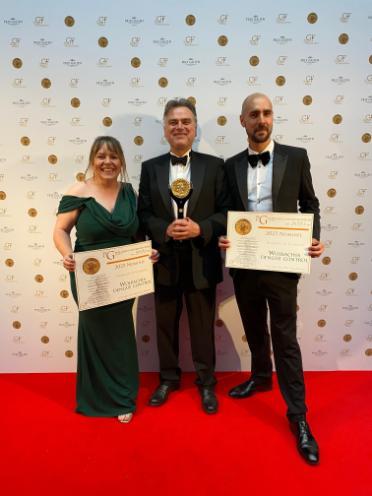CVR Team shortlisted for prestigious Prix Galien award
Published: 2 June 2025
A research team from the MRC-University of Glasgow Centre for Virus Research (CVR) has been shortlisted for a prestigious Prix Galien UK Award for their groundbreaking dengue virus control strategy, which is showing impressive success in the fight against dengue in Malaysia
A research team from the MRC-University of Glasgow Centre for Virus Research (CVR) has been shortlisted for a prestigious Prix Galien UK Award for their groundbreaking dengue virus control strategy, which is showing impressive success in the fight against dengue in Malaysia.
Currently, there are around 80-100 million cases of dengue fever annually across the world, with symptoms of the mosquito-borne infection including fever and sickness. In some rare cases dengue fever can cause serious illness, requiring urgent care.
The WolBloc group, led by Prof Steven Sinkins, is up for Best Public Sector Innovation at the Awards, which recognise achievement in health research and celebrate “made in the UK” innovations. The 2025 edition of the Prix Galien UK Forum & Awards Ceremony will be held on Thursday, 5 June in London, with winners selected by a committee of distinguished scientific leaders.

The nomination entry for their work – “Wolbachia-based interventions for the biological control of dengue” – demonstrates an approach which uses naturally occurring bacteria, Wolbachia (specifically the wAlbB strain) to block transmission of the dengue virus by Aedes aegypti mosquitoes.
Wolbachia, which are harmless to humans, are introduced into dengue hot-spot sites using releases of lab-reared mosquitoes. wAlbB then spreads through local mosquito populations and once established, remains at high levels in the mosquito population long term, and prevents them from transmitting dengue virus to people.
The work – which is a result of a partnership between the University of Glasgow, the Institute for Medical Research (IMR) Malaysia, and University of Melbourne – has led to the successful deployment of wAlbB mosquitoes across multiple urban sites in Malaysia.
Field trials have demonstrated a significant reduction in dengue incidence, with an overall drop in cases of over 70% when Wolbachia is established at high frequency. Unlike chemical insecticides, which can lose effectiveness due to mosquito resistance, the Wolbachia method is self-sustaining and environmentally friendly. The wAlbB strain is particularly suited to hot climates, as it maintains high density in mosquitoes and is resilient to heat stress.
Steven Sinkins, Professor and Associate Director of CVR, said: “We are truly honoured by the nomination for this award, which is a reflection of the dedicated work of the entire team.”
Dr Stephanie Rainey, Research Associate in the Sinkins group, added: “Our approach genuinely offers a scalable, long-term solution for countries battling dengue virus.”
Professor Sir Munir Pirmohamed, David Weatherall Chair of Medicine at the University of Liverpool and the NHS Chair of Pharmacogenetics, Chair of the Prix Galien UK Committee, said: “These individuals and organisations exemplify excellence in healthcare innovation and demonstrate a steadfast commitment to advancing patient outcomes. Their contributions are shaping the future of medicine and reinforcing the vital role of scientific progress in improving human health.”

First published: 2 June 2025
<< News

